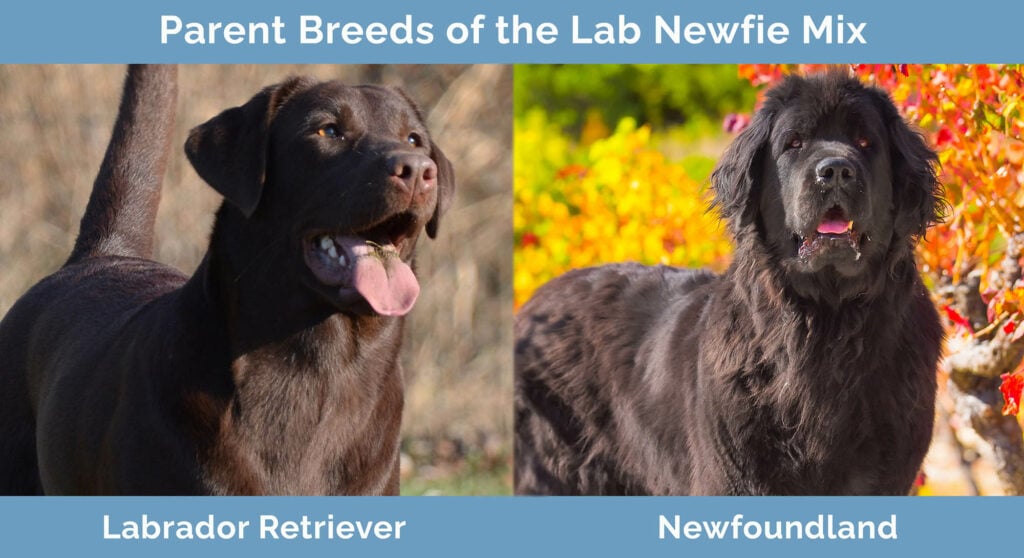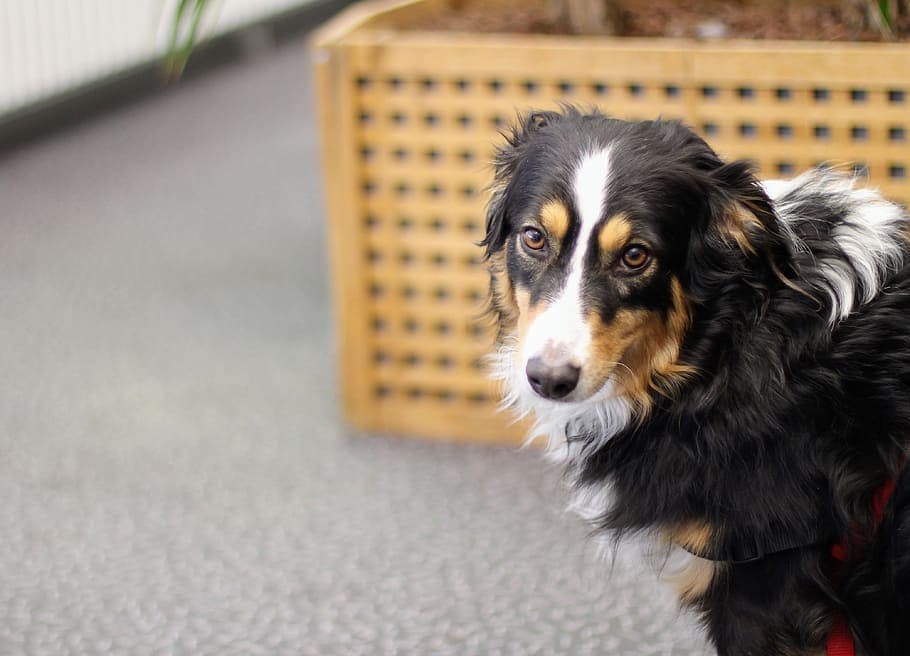Lab Newfie Mix: Pictures, Info, Care Guide & More
By Ed Malaker
Updated on

The Lab Newfie Mix, also known as a Newfie-Lab, is a crossbreed between a Labrador Retriever and a Newfoundland. They are friendly and affectionate dogs that get along with children and other pets but are also quite large and require a lot of space. If you are thinking about getting one of these dogs but would like to learn more about them first, keep reading while we discuss diet, exercise, common health conditions, and more to help you make an informed purchase.
| Height: | 21–24 inches |
| Weight: | 55–80 pounds |
| Lifespan: | 8–12 years |
| Colors: | Black, brown, white, gray, cream |
| Suitable for: | Families, children, pets |
| Temperament: | Friendly, loyal, affectionate |
One of the most interesting things about the Lab Newfie Mix is their unique appearance. These dogs can inherit a range of physical characteristics from their parents, resulting in various coat colors and textures. Additionally, Lab Newfie Mixes are known for their large size and impressive strength, which can make them great working dogs or companions for active families. Their friendly and affectionate nature makes them great for families with children or other pets.
Lab Newfie Mix Characteristics
Lab Newfie Mix Breed Puppies
https://www.instagram.com/p/CclDDFXrGjW/?utm_source=ig_web_copy_link
As puppies, Lab Newfie Mixes are typically playful and will spend a lot of time trying to get you to join in with their games. They can be a bit clumsy due to their large size, and some might even describe them as rowdy, but with proper training, they can grow into well-behaved adults who will make a great addition to the family. When it comes to finding a Lab Newfie Mix puppy, it may be a bit more challenging than finding a purebred Labrador Retriever or Newfoundland. Unfortunately, no major kennel clubs recognize it yet, so professional breeders don’t usually breed them. However, you may be able to find Lab Newfie Mix puppies through rescue organizations or local breeders who specialize in crossbreeds.

Temperament & Intelligence of the Lab Newfie Mix
The Lab Newfie has a friendly, loyal, and affectionate temperament, and many owners know them as being gentle and patient. They are a great choice for families with children or other pets and are intelligent and trainable enough to take on many roles, including working dogs, service dogs, and family pets. They are social dogs that enjoy spending time around people and can suffer from separation anxiety if you leave them alone too long.
Are These Dogs Good for Families? 👪
Yes, Lab Newfie Mixes great dogs for families. They are friendly and affectionate, making them great companions for children and older adults, and their protective nature helps them be fantastic watch dogs.
Does This Breed Get Along With Other Pets?
Lab Newfie Mixes generally get along well with other pets, especially if you socialize them with various animals when they are still puppies. They can make great companions for other dogs, cats, and even smaller animals like rabbits or guinea pigs and will even accept new animals that come later.
Things to Know When Owning a Lab Newfie Mix
Food & Diet Requirements 🦴
Lab Newfie Mixes are large dogs and require a healthy and balanced diet to maintain their health and energy levels. However, they also tend to overeat, which can lead to obesity and other health issues, so monitoring their food intake and providing them with appropriate portion sizes is important. Look for high-quality, nutritious dog food suitable for your pet’s size, age, and activity level. Look for food with real meat as the first ingredient and avoid foods with fillers or artificial preservatives.
Exercise 🐕
Lab Newfie Mixes are a moderate to high-energy breed, requiring 60–90 minutes of daily exercise to stay healthy. You can break it up into two or three shorter sessions, depending on your schedule and your dog’s needs, and they enjoy many activities, including long walks, hiking, swimming, and playing fetch. They can also benefit from mental stimulation and enrichment activities, including games, puzzles, obedience training, and interactive toys.
Training 🎾
Lab Newfie Mixes are intelligent and eager to please, making them relatively easy to train, but they can also be strong-willed and may require consistent and patient training techniques. Start with basic obedience commands like sit, stay, come, and heel while using positive reinforcement techniques, such as praise and treats, to encourage good behavior and discourage bad behavior. Socialization is also important when training your Lab Newfie Mix to help them feel comfortable and confident in new situations, which can help prevent behavior issues such as fear or aggression towards unfamiliar people or animals. Additionally, it’s important to establish rules and boundaries for your Lab Newfie Mix by using crate training, leash training, and house training. If you are having trouble, a trainer can help you develop a customized training plan and provide guidance and support as you work to train your dog.
Grooming ✂️
Lab Newfie Mixes have a thick, double coat that sheds moderately year-round and heavily during seasonal shedding, so they require regular grooming to keep their coat healthy and clean. Brush their coat at least once a week using a slicker or pin brush to help remove loose fur and prevent matting, increasing the frequency during periods of heavy shedding. You will also need to bathe your Lab Newfie Mix every 6 to 8 weeks to keep their coat clean and healthy using a dog-specific shampoo and conditioner.
Health and Conditions
- Hypothyroidism
- Progressive retinal atrophy
- Hip dysplasia
- Elbow dysplasia
Minor Conditions
- Hypothyroidism: Hypothyroidism is when the thyroid gland doesn’t produce enough hormones, leading to weight gain, lethargy, and other symptoms. Unfortunately, there is no cure, but doctors can treat it with hormone replacement therapy.
- Progressive Retinal Atrophy: Progressive retinal atrophy is a genetic condition that affects the eyes, causing progressive vision loss and eventual blindness. Symptoms include resistance to going outside in the dark and bumping into things in dim lighting.
Serious Conditions
- Hip Dysplasia: Hip dysplasia is a genetic condition that affects the hip joint, causing pain and mobility issues. It worsens as the dog ages, and symptoms can include decreased activity, decreased range of motion, lameness in the hind end, loss of thigh muscle mass, and more. Treatment usually involves weight management and physical therapy but can also include medication or surgery.
- Elbow Dysplasia: Elbow dysplasia is similar to hip dysplasia but affects the elbow joints. It can start when your dog is still a puppy, and symptoms include paws or elbows sticking out at a strange angle and a sharp decrease in activity levels. Treatment includes surgery to repair or replace the joint and weight management.
Male vs Female
Males are generally larger and heavier than females, although this can vary based on genetics and individual dogs, and females may be more independent and less dominant than males. However, the differences are minor, and many people often have trouble telling males from females.
3 Little-Known Facts About The Lab Newfie Mix
1. The Lab Newfie Mix is a good swimmer with a natural affinity for the water that allows them to swim for extended periods without getting tired.
2. Because of their gentle temperament and high level of intelligence, many people use Lab Newfie Mixes as therapy dogs.
3. They tend to drool, as both parents are heavy droolers.
Final Thoughts
Overall, the Lab Newfie Mix can make an excellent companion for the right owner. They are loyal, friendly, and intelligent dogs that thrive on human interaction. They get along with children and other pets and make great companions at the beach and on the trail. However, they require regular exercise, training, and socialization, so they may not be the best choice for first-time dog owners or those with a busy lifestyle.
See also:
- Berniefie (Bernese Mountain Newfoundland Mix): Pictures, Info, & Care Guide
- Border Newfie (Border Collie & Newfoundland Mix): Info, Pics, Facts
Featured Image Credit:














